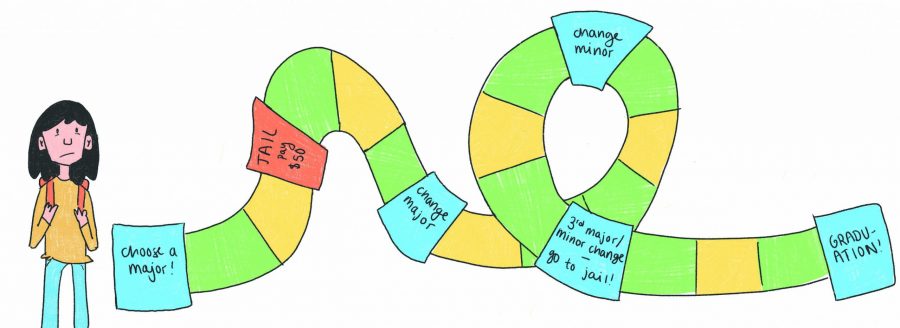
Graphic by Samantha Lopez | Mercury Staff
Change of major fee ineffective, not always necessary
I entered UTD as a visual and performing arts major with a
theatre concentration. Over the next year and a half, I added a second major in
political science. I ended up changing that political science major to a public
policy major and, finally, switched my initial visual and performing arts major
to a theatre minor. At each and every stage of this process, I talked to
advisors both in the School of Arts and Humanities and the School of Economic,
Political and Policy Sciences. The month I changed my theatre major to a minor,
I saw a $50 charge that I did not recognize on my student account — a “change
of major” fee. I looked up the university policy regarding the fee, and found
out that it resulted from changing majors more than two times in one academic
career. Over the course of my three degree plan changes through two university
schools, I was never informed or given any warning of this fee — and its
purpose is still unclear to me. Are the administrative costs of students
changing majors really so high? Why are those costs not covered under tuition
and other fees?
While it is in everyone’s best interest to encourage timely
degree completion, there are many problems with using the change of major fee
as a deterrent and better solutions to encouraging timely completion.
Firstly, the change of major fee cannot act as a deterrent
if students do not know about it. Every student may promise to read the
university policies at the beginning of their academic careers, but advisors
play a large role in ensuring that students understand those policies and their
consequences. I was not informed about the change of major fee until it was
charged to my account, despite talking to advisors multiple times.
Additionally, had I known about this policy, I would have wondered, does
dropping a major to a minor really count as a change of major for the fee? What
other degree plan changes constitute a change of major?
While the “Degree Plans” section of the 2019 Undergraduate
Catalog states that “If a student elects to modify his/her major more than two
times during an academic career, the third modification requires a $50.00 fee,”
the “Tuition and Financial Aid” section states “There is a $50.00 fee for
students changing majors more than two times in an academic career.” This
leaves ambiguity as to whether degree plan changes past the third modification
also require the fee, or if it will only be charged once during an academic
career. If I were to modify my degree plan by declaring a minor, would I be
charged the fee again? If these policies are to be effective, they cannot be
ambiguous and must be clearly communicated to students well before the fee
would be applied.
Even if information about the fee was clearly communicated,
punitive policies that charge students for actions that may increase their time
to completion are not effective. Adding a fee to students who may already face
increased costs from having to spend more time in school does not help them
finish faster, it just increases their debt. A 2018 analysis from the American
Educational Research Association found
no evidence that increasing fees to discourage excess hours increases student
completion rates.
In 2018, UTD sat right at the statewide average for
four-year public institutions of the average number of credit hours taken to
complete a degree: 137. Because most degree plans are 120 credit hours, this is
an extra one to two semesters students spend taking credit hours in excess of
their degrees. Taking excess hours leads to higher costs and more time for
students, which can increase overall student debt. Additionally, universities
are often evaluated on their graduation rates, so students not completing their
degrees in a timely manner — or at all — is not only harmful for the student,
but for the university as well. Changing degree plans is one thing that could
keep students in school longer than they need to be. I understand that the
change of major fee was likely implemented to deter students from switching
degree plans so many times that they would need to stay at UTD longer than they
needed to.
However, if the university wants to deter students from
taking excess hours, individual student situations must be considered. Even
after my three major changes, I am still able to take two semesters off campus,
and I have around seven elective classes free during my senior year. A $50 fee
does not encourage me to complete faster or discourage me from changing my
degree plan, it just makes me feel like the university is punishing me.
Each student is unique, and the best mechanism to help
students make decisions about their degree plan should be their advisor, not a
university-imposed fee. Advisors can give students individual attention and
make recommendations to encourage students to complete their degree plans on
time. The university should be engaged in active, positive advising rather than
levying punitive, inflexible fees.
I am lucky that I had the means to pay it, but not every
student does. Excess fees can keep students from getting their transcripts or
re-enrolling at the university. UTD has a responsibility to ensure that its
policies are in the best interests of its students, faculty, staff and
community members, but the change of major fee is not. Abolishing this fee
would be a small but meaningful improvement for the school.
Roma Venkateswaran is a public policy senior from North Potomac, Maryland.